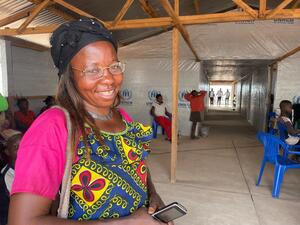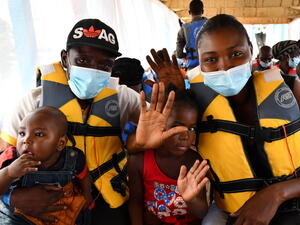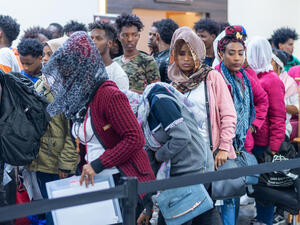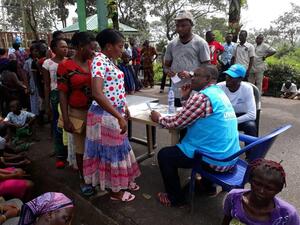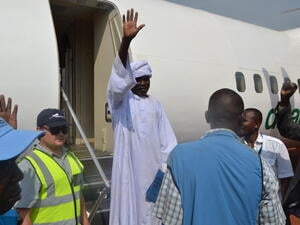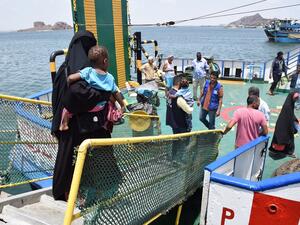Love in the time of repatriation
Love in the time of repatriation
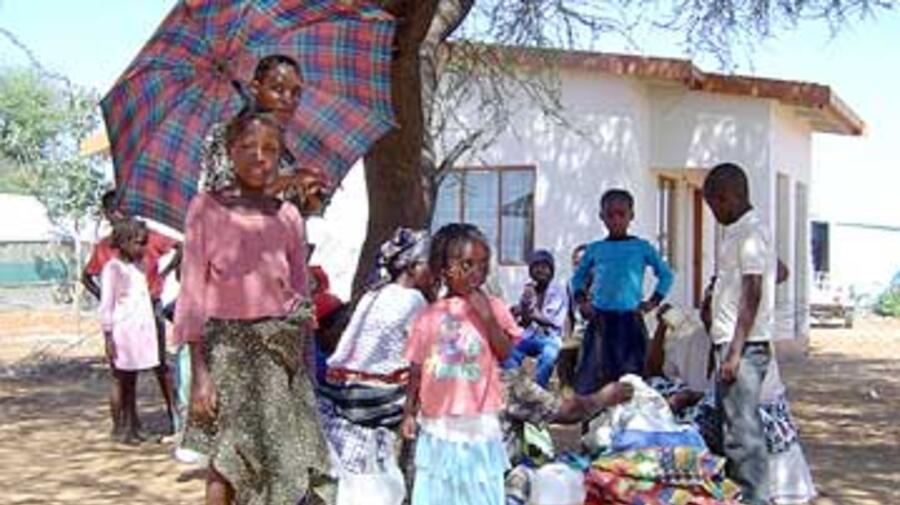
Waiting – An Angolan family waits in the shade to check in their luggage a day before their departure from Osire camp.
WINDHOEK, Namibia, Nov 18 (UNHCR) - When the chartered aircraft takes off from the Windhoek airstrip to Angola every Thursday morning, the repatriation number rises by another hundred.
The whole operation runs like clockwork, flying more than 1,000 Angolan refugees in Namibia's Osire camp back to central Angola's Huambo province since the start of airlifts in September. Quite predictably, the upcoming rainy season will stop the cogwheels for a few months. More unexpectedly, love can sometimes get in the way of the clockwork too.
Each Thursday at 3 a.m., the Women's Centre in Osire camp buzzes with activity as refugees board the buses that will bring them to the Windhoek airport, three hours to the south. Mothers search for their ever-escaping children. Young people help the elderly onto the bus. Last farewells are exchanged. Some refugees are nervous about the flight, given that the only planes they have ever known are the ones passing overhead. The older people think about the imminent reunion with friends and relatives left behind and the young ones wonder what Angola will be like.
There is an air of excitement and anticipation among the crowd. But for this trip to happen, a long chain of preparations had been set in motion many months before.
First the refugees were informed about the repatriation operation. A refugee delegation went on a go-and-see visit to Angola and reported back to their countrymen in Osire camp. Delegations of Angolan parliamentarians also came to the camp in Namibia to assure the refugees that Angola was safe and peaceful. Angolans constitute the majority of the refugees at Osire, numbering 8,000 out of the total 11,000 inhabitants.
Many weeks ago, all Angolan families here received brochures in Portuguese informing them about return procedures. They know how much luggage they can carry and how the reception is organised on the Angolan side. It is with these facts in mind that they can make an informed decision about voluntary repatriation.
Those who want to return fill in a Voluntary Repatriation Form and confirm that they indeed want to go out of their free will. The refugees are informed about the date of departure a few days in advance. They receive big plastic bags to pack their belongings. Medical screening makes sure that they are fit to fly. Women beyond the seventh month of pregnancy will have to wait until their babies are born.
On the Wednesday before departure, the returnees check in their luggage. Each bag needs to be weighed. Two refugee women heave the heavy loads onto the hook of the scales while their male colleagues do the registration. No exemptions. Everybody is treated equally. Surprisingly, no one pleads or haggles for more cargo than allowed, but they unpack what they can manage without.
Those who fail to show up for this exercise cannot leave on the next day's flight. They are substituted by people from a waiting list who also came here with their luggage - just in case.
Each time there are a few dropouts. Alexandra Boon of UNHCR Osire explains that some fall ill or change their minds last minute. Today a young man named Roberto is absent and he is being missed - by his girlfriend Julia.
Why Roberto did not show up? When UNHCR staff inquire at his house, they only see his angry mother. "I locked him up. He is not going anywhere!" she shouts. Roberto, it turns out, is a teenager from Uíge province in northern Angola. "He has no business in Huambo," Mama Maria says. "We are from a different region. He has to go back with his own family!"
It is love that made the young man register for the flight to Huambo. Julia is going back home with her family. She is pregnant and the lovers did not want to part, so Roberto decided to come along. But both are minors, and it is their parents who have the last word. Love in the time of repatriation can be difficult.
Once the trucks set off with the luggage, the returning refugees have time to contemplate their last day in Osire. Many of them have spent more than 10 years here. Children were born in the camp; some people died here. They made friends and enemies; they got married and had good and bad days in the camp.
On Wednesdays, the returning families have to leave the adobe huts that have been their homes for a few years. They spend the last night in a big hall at the Women's Centre to make sure that everybody wakes up, receives breakfast and gets on the bus on time. No one who is enlisted should be left behind.
But organisers do not want surplus passengers either. On one of the previous convoys, a young girl sneaked in and hid under a seat so she could accompany her boyfriend. Now Africare staff check the buses before the returnees go on board. Once again, it is love that complicates the repatriation process.
As the sun comes out, the convoy prepares to leave. Police, an ambulance, UNHCR and IOM staff accompany the buses as they set off for their journey to Windhoek airport. There, the usual airport procedures ensue: Checking of identities, screening of the hand luggage, boarding of the aircraft.
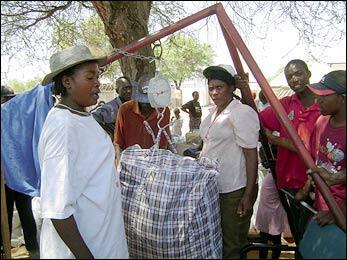
Weighing - Each returnee is allowed 30 kg of luggage, no more, no less.
Castro is an elderly man who has spent 15 years in exile. How does he feel now, about to walk to the plane? He breaks into a broad smile: "Splendido! Tonight I am going to sleep in my own country again!"
UNHCR is the lead agency for the Angolan repatriation, in charge of coordinating the activities and safeguarding the voluntary nature of the return process. Preparation activities on the ground in Namibia are supported by non-governmental organisation Africare while the International Organization for Migration is in charge of air operations.
By Melita H. Sunjic in Windhoek, Namibia

